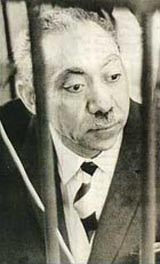The America That I Have Seen

It is hard to imagine that modern militant Islam, al-Qaeda and the September 11, 2001 tragedy may have all had their birth in quiet, sedate hamlet of Greeley, Colorado, but there is at least an argument that this is the case. Sayyid Qutb (born on this day in 1906 in Musha, Qaha, Egypt) was an obscure critic and inspector of schools for the Egyptian ministry of education during the 1930s and 40s -- a scribbling cafe-bachelor and the author of a minor novel -- who had just stuck his toe in the waters of advocating unadorned Islamism as a comprehensive way of life with his somewhat understated, moderate commentary, Social Justice in Islam (1948), when the Egyptian government sent him to Greeley for a few months in 1949 to study U.S. education techniques.
He reacted with scorn to what he perceived to be the promiscuity of American culture (even in the relatively conservative climate of the post-War American Plains, in a town where alcohol was illegal!); he denounced American churches as "entertainment centres and sexual playgrounds" after attending a church social, interpreted the green lawns in front of Greeley's modest homes as symbols of American greed, and branded American women as seductively-dressed vixens and American men as violent monsters obsessed with bloody sports such as boxing and football.
Turning his American experience back upon his homeland, he joined the fundamentalist Muslim Brotherhood and began to articulate a critique of Egypt under Farouk, who was by symbol and deed adopting a modern secular persona, informed by the values of the Western culture that so repulsed Qutb in Greeley. In response to the creeping secularization of his world, Qutb constructed a theologically-based argument based on the work of the 13th century commentator Ibn Tamiyyah in favor of violent Muslim resistance or jihad -- an ancient tenant of Islam traditionally reserved only for waging "holy war" against non-Muslims, as killing Muslim political leaders was expressly forbidden within Islam -- against corrupt regimes that claim to be Muslim.
After the assassination of Muslim Brotherhood founder Hassan al-Banna, Qutb assumed the role of intellectual leader within the Brotherhood as it participated in the overthrow of Farouk; however, as it became clear that Farouk's successor General Nasser would not impose Islamic law on Egypt, Qutb turned his critique on Nasser. On October 26, 1954, a member of the Brotherhood attempted to assassinate Nasser, who retaliated by imprisoning the leaders of the Brotherhood, including Qutb. He was tortured and at trial was sentenced to life in prison by a panel of judges which included Anwar as-Sadat, but his sentence was commuted to 15 years due to poor health.
While he was in prison, Qutb's writings turned more radical in tone. His influential commentary, In the Shadow of the Koran (1952- ) emphasized the literary beauty of the Koran while demanding uncompromising adherence to Muslim laws, but his Milestones (not published until 1964) called for a revolutionary form of Islam to come forward and violently shake off the pagan yolk -- both that of the West and its toadying faux-Islam East. Abdul-Salaam Arif of Iraq eventually convinced Nasser to release Qutb, but shortly after the publication of Milestones, Nasser arrested him again on the basis of the book and a conspiracy charge, and ultimately had Qutb executed on August 29, 1966.
Nasser believed that Qutb's movement died with him, but it had a direct influence on the group that assassinated Sadat in 1981. Although most of Qutb's invective was directed at corrupt Westernized Muslims, Qutb's memoir of Greeley, The America I Have Seen, has focused his followers on America as a symbol of decay, a perception that has no doubt been encouraged by the same American cultural and economic imperialism that has irked other cultures (say, the French) and America's more recently aggressive, seemingly anti-Arab foreign policy.
Labels: Islam





0 Comments:
Post a Comment
Subscribe to Post Comments [Atom]
<< Home